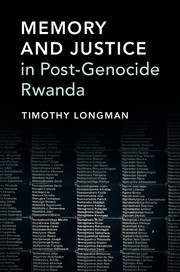58 results
Review of William R. O'Neill SJ, Reimagining Human Rights: Religion and the Common Good (Washington: Georgetown University Press, 2021, vii, 247.)
-
- Journal:
- The Review of Politics / Volume 84 / Issue 1 / Winter 2022
- Published online by Cambridge University Press:
- 21 October 2021, pp. 160-162
-
- Article
- Export citation
4 - Justice as Memory
- from Part I - Creating What You Are Afraid of
-
- Book:
- Memory and Justice in Post-Genocide Rwanda
- Published online:
- 30 August 2017
- Print publication:
- 13 July 2017, pp 91-134
-
- Chapter
-
- You have access
- HTML
- Export citation
Dedication
-
- Book:
- Memory and Justice in Post-Genocide Rwanda
- Published online:
- 30 August 2017
- Print publication:
- 13 July 2017, pp v-v
-
- Chapter
- Export citation
Part I - Creating What You Are Afraid of
-
- Book:
- Memory and Justice in Post-Genocide Rwanda
- Published online:
- 30 August 2017
- Print publication:
- 13 July 2017, pp 27-186
-
- Chapter
-
- You have access
- HTML
- Export citation
1 - Introduction: The Meaning of Murambi
-
- Book:
- Memory and Justice in Post-Genocide Rwanda
- Published online:
- 30 August 2017
- Print publication:
- 13 July 2017, pp 1-26
-
- Chapter
- Export citation
8 - Politics by Other Means: Popular Opinion about “Transitional Justice”
- from Part II - Popular Narratives
-
- Book:
- Memory and Justice in Post-Genocide Rwanda
- Published online:
- 30 August 2017
- Print publication:
- 13 July 2017, pp 271-310
-
- Chapter
- Export citation

Memory and Justice in Post-Genocide Rwanda
-
- Published online:
- 30 August 2017
- Print publication:
- 13 July 2017
Frontispiece
-
- Book:
- Memory and Justice in Post-Genocide Rwanda
- Published online:
- 30 August 2017
- Print publication:
- 13 July 2017, pp vii-viii
-
- Chapter
- Export citation
5 - From Violent Repression to Political Domination
- from Part I - Creating What You Are Afraid of
-
- Book:
- Memory and Justice in Post-Genocide Rwanda
- Published online:
- 30 August 2017
- Print publication:
- 13 July 2017, pp 135-186
-
- Chapter
-
- You have access
- HTML
- Export citation
Figures
-
- Book:
- Memory and Justice in Post-Genocide Rwanda
- Published online:
- 30 August 2017
- Print publication:
- 13 July 2017, pp x-x
-
- Chapter
- Export citation
Acknowledgments
-
- Book:
- Memory and Justice in Post-Genocide Rwanda
- Published online:
- 30 August 2017
- Print publication:
- 13 July 2017, pp xi-xii
-
- Chapter
- Export citation
2 - Rewriting History in Post-Genocide Rwanda
- from Part I - Creating What You Are Afraid of
-
- Book:
- Memory and Justice in Post-Genocide Rwanda
- Published online:
- 30 August 2017
- Print publication:
- 13 July 2017, pp 33-64
-
- Chapter
-
- You have access
- HTML
- Export citation
9 - “We Pretend to Live Together”
- from Part III - Conclusion
-
- Book:
- Memory and Justice in Post-Genocide Rwanda
- Published online:
- 30 August 2017
- Print publication:
- 13 July 2017, pp 313-340
-
- Chapter
- Export citation
6 - Political Reform in Three Rwandan Communities
- from Part II - Popular Narratives
-
- Book:
- Memory and Justice in Post-Genocide Rwanda
- Published online:
- 30 August 2017
- Print publication:
- 13 July 2017, pp 189-230
-
- Chapter
- Export citation
Contents
-
- Book:
- Memory and Justice in Post-Genocide Rwanda
- Published online:
- 30 August 2017
- Print publication:
- 13 July 2017, pp ix-ix
-
- Chapter
- Export citation
Dedication
-
- Book:
- Memory and Justice in Post-Genocide Rwanda
- Published online:
- 30 August 2017
- Print publication:
- 13 July 2017, pp vi-vi
-
- Chapter
- Export citation
Abbreviations
-
- Book:
- Memory and Justice in Post-Genocide Rwanda
- Published online:
- 30 August 2017
- Print publication:
- 13 July 2017, pp xiii-xiv
-
- Chapter
- Export citation
3 - Symbolic Struggles
- from Part I - Creating What You Are Afraid of
-
- Book:
- Memory and Justice in Post-Genocide Rwanda
- Published online:
- 30 August 2017
- Print publication:
- 13 July 2017, pp 65-90
-
- Chapter
-
- You have access
- HTML
- Export citation
Copyright page
-
- Book:
- Memory and Justice in Post-Genocide Rwanda
- Published online:
- 30 August 2017
- Print publication:
- 13 July 2017, pp iv-iv
-
- Chapter
- Export citation
Part III - Conclusion
-
- Book:
- Memory and Justice in Post-Genocide Rwanda
- Published online:
- 30 August 2017
- Print publication:
- 13 July 2017, pp 311-340
-
- Chapter
- Export citation

